
By Robert St. Martin & Valerie Milano
Palm Springs, CA (The Hollywood Times) 1/4/25 – Screening at the Palm Springs International Film Festival on Saturday, January 4, is Miguel Gomes’ Grand Tour, a 2024 historical drama film co-written and directed by Miguel Gomes, starring Gonçalo Waddington and Crista Alfaiate. The film premiered in May 2024 at the 77th Cannes Film Festival, and was selected to compete for the Palme d’Or in its main competition section, where Miguel Gomes won the Best Director award. In September 2024, it was selected as the Portuguese entry for Best International Feature Film at the 97th Academy Awards; it previously screened at the AFI FEST in Hollywood in late October 2024. Miguel Gomes is one of Portugal’s leading filmmakers – known for Our Beloved Month of August (2008), Tabu (2012), Arabian Nights (2015), and The Tsugua Diaries (2021). Grand Tour screens at the Camelot Theatres on Saturday, Jan. 4; Tuesday, Jan. 7 at the Mary Pickford 10; and Saturday, Jan. 11 at the Festival Theatres 1.
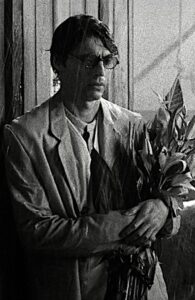
Grand Tour kicks off in 1918 in Burma, when Rangoon is a city under British colonial rule. It centers on Edward, a civil servant for the British Empire, who runs away from his fiancée Molly the day she arrives to get married. During his travels, however, panic gives way to melancholy. Contemplating the emptiness of his existence, the cowardly Edward wonders what has become of Molly. Determined to get married and amused by Edward’s move, Molly follows his trail on this Asian grand tour.
But with Molly in pursuit, sending him regular, cheerfully terse telegrams about her impending arrival, he has to keep moving. He heads for Bangkok on a derailing train, then Saigon as a fishing-boat stowaway. In Manila he experiences “euphoric highs and hangovers” and hops an American warship to Osaka along with some sailors and sex workers.
Ejected from Japan where they suspect him of spying, he is bounced to Shanghai, and thence to the interior of China, to Chongqing (by some metrics currently the world’s largest city), then Chengdu and then deeper into Sichuan province, with the goal of reaching Tibet in mind. Which is when, at about the midway point, we spin back and follow Molly instead, hot on the heels of Edward’s cold feet, as she has adventures and romances and setbacks of her own.
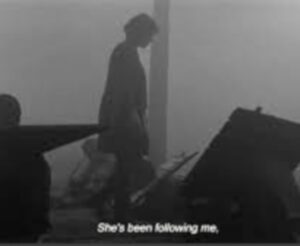
Sometimes in color, sometimes in monochrome, with the narrators speaking the local lingo and knitting Edward and Molly’s colonial-era stories into the Asia of today, we get gorgeous on-the-fly snapshots of modern life across the continent. A rickety Rangoon ferris wheel propelled by hand (and foot). Workers untangling the wires atop Saigon’s overloaded telephone poles. Old Chinese men playing mahjong; Filipino locals riding tuktuks; Lunar New Year fireworks exploding over the Saigon skyline; a portly man in a restaurant moving himself to tears with his karaoke rendition of “My Way” before returning to his noodles, dabbing at wet eyes.
The film also has a recurring motif in the puppet shows that seemingly every culture has developed, and developed differently, as a storytelling medium. There are marionettes and paper silhouettes and two-person representations of — are they turkeys? Ostriches? Who knows? But that we always see the puppeteers as much as we see their puppets seems appropriate to the sense we get.
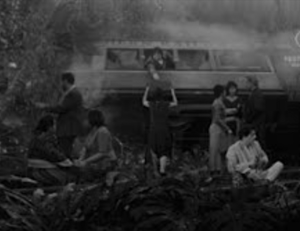
The film’s producer Filipa Reis explains how the project came together. It was over dinner with Reis that Gomes first presented his idea for the film, in which narrative sequences shot in a studio would be intercut with footage of contemporary Asia. “The idea was… I don’t know… very appealing and charming,” says Reis, who was a co-producer on The Tsugua Diaries (2021). Gomes then asked her to produce it.
The plan was for Gomes to take a small documentary-style crew to seven Asian countries – Myanmar, Vietnam, Thailand, Singapore, Philippines, Japan and China – shooting in 16mm so “that we could build this archive and then to write the script according to what was found,” Reis says.
They started pre-production in 2019, and Gomes then commenced his own grand tour of Asia, beginning in 2020. The shoot was interrupted by COVID, just as they were about to travel by boat to Shanghai, and then a local crew finished the shoot in China at the start of 2022, with Gomes directing remotely from Portugal. Gomes then completed the script and Reis submitted applications for funding in Portugal, Italy and France, as well as from the Eurimages program. Once those funds were in place, Gomes shot the narrative sequences in studios in Portugal and Italy in early 2023.
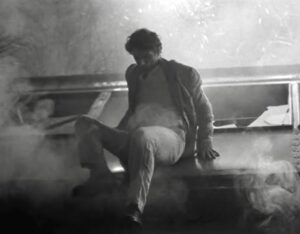
Reis says it was a “challenge” to do the Asia trip without a script, adding “it’s not as it’s meant to be in the industry, but it was also very appealing.” She adds that it required “a risk” to be taken to shoot the archive footage before applying to the production funds. Asked how working with Gomes compares with working other directors, she says: “He’s very unique. And I think to work with him, you really have to be very confident about what he’s doing, because it can be a proposal that’s a bit outside the box compared with the way you are used to doing things, and the way the funds and the industry thinks things are supposed to be done.”
During the studio shoot they had “links to some rough edit archive footage, so that when you read the script, you could understand at least how the narrative footage crossed over with the archive,” she says. The narrative sequences are in Portuguese, except for one character who speaks in French. The archive footage is in the language of the country that the crew were shooting in.
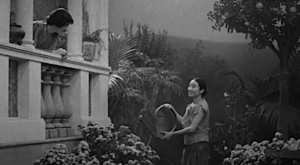
Although the story takes place in Asia during a time of imperial rule in many countries, colonialism isn’t the theme, Reis says, in contrast to Tabu. “I would say that it’s something new. Of course, ‘Tabu’ is a great film, but I think this one will be surprising,” she says, enigmatically.
As to the tone of Grand Tour, it contains both comedy and tragedy, but it is also melancholic. As a “grand tour” of parts of southeastern Asia, Grand Tour finds it way at the end to Shanghai and up the Yangtze River during the flooding season – all the way to Chengdu, with its huge Buddha statue carved in the cliff overlooking the river and the pandas eating shoots in the trees. The ultimate fate of Molly Singleton in search of her missing fiancée Edward is a doubling of the story structure in a most fascinating way.